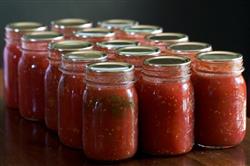Preserve Your Food Safely

We have seen an increase in gardens, as people have had more time at home due to the pandemic, we have also seen an increase in food preservation. If you are putting the time and effort into food preservation, you want to ensure that you have a quality product that is also safe for you and your family and friends to consume.
The three most common methods of preserving food are Canning (Water bath and pressure canning), Freezing and Drying or dehydrating.
Canning is the process in which foods are placed in jars and heated to a temperature that destroys microorganisms and inactivates enzymes. This heating and later cooling forms a vacuum seal. The vacuum seal prevents other microorganisms form recontaminating the food with the jar. Acid foods such as fruits and tomatoes can be processed or “canned” in boiling water, while low acid vegetables and meats must be processed in a pressure canner at 240oF (ten pounds of pressure at sea level).
Pickling is another form of canning. Pickled products have an increased acidity that makes it difficult for most bacteria to grow. The amount of acid present is very important to the safety of the product. Pickled products are also heated in jars at boiling temperatures to destroy any other microorganisms present and form a vacuum in the jar.
Jams and Jellies have a very high sugar content. The sugar binds with the liquid present making it difficult for microorganisms to grow. To prevent surface contamination after the product is made and thus possible yeast or mold growth, these are either canned, frozen or refrigerated.
Freezing reduces the temperature of the food so that microorganisms cannot grow, however many will survive. Enzyme activity is slowed down but not stopped during freezing.
Drying removes most of the moisture from foods. Thus microorganisms cannot grow and enzyme action is slowed down. Dried foods should be stored in airtight containers to prevent moisture from rehydrating the products and allowing microbial growth.
If you are planning on preserving food and haven’t done it previously, ensure you are using tested and approved recipes and techniques. Follow the recipe step by step. If you are planning on using a pressure canner with a dial gage, you should have it checked a minimum of every other year. If you would like to have your pressure canner tested, please call the White County Extension office at 219-984-5115 to set up a time.

